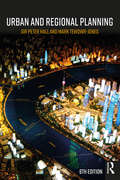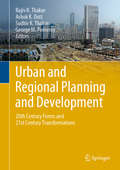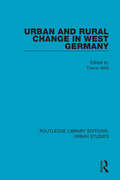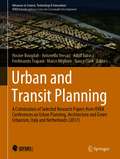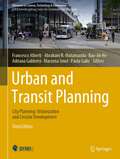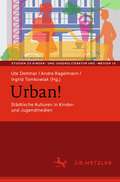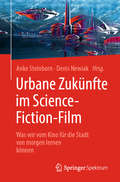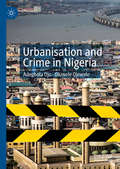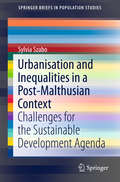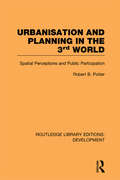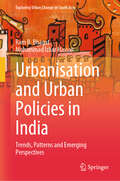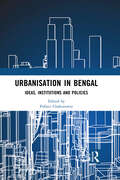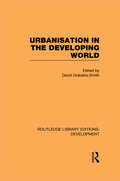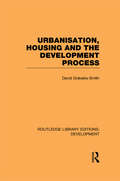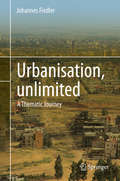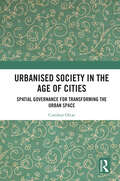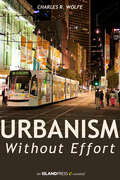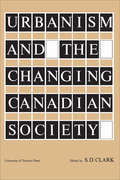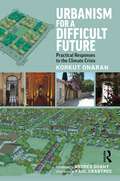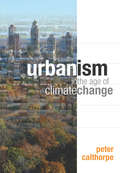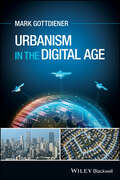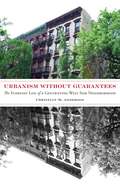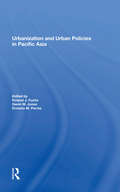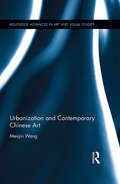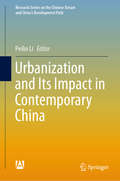- Table View
- List View
Urban and Regional Planning
by Peter Hall Mark Tewdwr-JonesThis is the sixth edition of the classic text for students of urban and regional planning. It gives a historical overview of the developments and changes in the theory and practice of planning throughout the entire 20th and first part of the 21st centuries. The extensively revised edition incorporates the most important developments in recent times: debates on economic rebalancing and national infrastructure including high speed rail, energy, millennium projects, Celtic devolution, European influence, impact of London on nation. A new chapter "Planning for cities and city regions 1990-2017": includes new material on housing, localism, neighbourhood planning, privatisation, city modernism, reform, Devo and city deals and metro mayors. Urban and Regional Planning will be invaluable to undergraduate as well as postgraduate Planning students. It will prove useful in a variety of built environment areas such as Architecture, Landscape Architecture, Urban Design, Real Estate where planning is taught.
Urban and Regional Planning and Development: 20th Century Forms and 21st Century Transformations
by Ashok K. Dutt Rajiv R. Thakur Sudhir K. Thakur George M. PomeroyThis book discusses urban planning and regional development practices in the twentieth century, and ways in which they are currently being transformed. It addresses questions such as: What are the factors affecting planning dynamics at local, regional, national and global scales? With the push to adopt a market paradigm in land development and infrastructure, the relationship between resource management, sustainable development and the role of governance has been transformed. Centralized planning is giving way to privatization, not only in the traditional regions but also in newly emerging regions of Asia, Africa and Latin America. Further, attempts are being made to bring planning related decision-making closer to the people who are most affected by it. Presenting a collection of studies from scholars around the world and highlighting recent advances in the field, the book is a valuable reference guide for those engaged in urban transformations, whether as graduate students, researchers, practitioners or policymakers.
Urban and Rural Change in West Germany (Routledge Library Editions: Urban Studies #24)
by Trevor WildOriginally published in 1983. Attention is focused in this book on the principal functional, spatial and morphological changes which had taken place within West Germany’s uniquely arranged mosaic of cities, towns and intervening rural areas during the postwar period. The topics covered here have been carefully selected as key foci of interest, and their thematic approach is supported by a large variety of detailed, local case studies. This title will be of interest to students of urban geography and urban studies.
Urban and Transit Planning: A Culmination of Selected Research Papers from IEREK Conferences on Urban Planning, Architecture and Green Urbanism, Italy and Netherlands (2017) (Advances in Science, Technology & Innovation)
by Nancy Clark Hocine Bougdah Antonella Versaci Adolf Sotoca Ferdinando Trapani Marco MiglioreA volume of five parts, this book is a culmination of selected research papers from the second version of the international conferences on Urban Planning & Architectural Design for sustainable Development (UPADSD) and Urban Transit and Sustainable Networks (UTSN) of 2017 in Palermo and the first of the Resilient and Responsible Architecture and Urbanism Conference (RRAU) of 2018 in the Netherlands. This book, not only discusses environmental challenges of the world today, but also informs the reader of the new technologies, tools, and approaches used today for successful planning and development as well as new and upcoming ones. Chapters of this book provide in-depth debates on fields of environmental planning and management, transportation planning, renewable energy generation and sustainable urban land use. It addresses long-term issues as well as short-term issues of land use and transportation in different parts of the world in hopes of improving the quality of life. Topics within this book include: (1) Sustainability and the Built Environment (2) Urban and Environmental Planning (3) Sustainable Urban Land Use and Transportation (4) Energy Efficient Urban Areas & Renewable Energy Generation (5) Quality of Life & Environmental Management Systems. This book is a useful source for academics, researchers and practitioners seeking pioneering research in the field.
Urban and Transit Planning: City Planning: Urbanization and Circular Development (Advances in Science, Technology & Innovation)
by Francesco Alberti Abraham R. Matamanda Paola Gallo Adriana Galderisi Bao-Jie He Marzena SmolThis book represents a compilation of research in sustainable architecture and planning. Its main focus is offering strategies and solutions that help reducing of the negative impacts of buildings on the environment and emphasizing the suitable management of available resources. By tackling the topic of sustainability from a historical perspective and also as a vision for the future, the book in hands provides new horizons for engineers, urban planners and environmentalists interested in the optimization of resources, space development, and the ecosystem as a whole to address the complex unresolved problems our cities are facing. This book is a culmination of selected research papers from IEREK’s sixth edition of the International Conference on Urban Planning & Architectural Design for Sustainable Development (UPADSD) held online in collaboration with the University of Florence, Italy (2021) and the first edition of the International Conference on Circular Economy for Sustainable Development (CESD) held online in collaboration with the University of Salento, Lecce, Italy (2021).
Urban!: Städtische Kulturen in Kinder- und Jugendmedien (Studien zu Kinder- und Jugendliteratur und -medien #13)
by Ute Dettmar Ingrid Tomkowiak Andre KagelmannAls literarischer Handlungsraum hat sich die Stadt, vor allem die Großstadt, sowohl mit Blick auf die Erzählformen als auch in den semantischen Zuschreibungen innerhalb von etwa 150 Jahren grundlegend gewandelt. Im kinder- und jugendliterarischen Umgang mit den urbanen Räumen werden Veränderungen der Konstruktionen von Kindheit und Adoleszenz ebenso manifest wie die Ausdifferenzierung der Erzählformen. Heute wird Stadt als ein plurales, vielstimmiges und vielschichtiges Gefüge dargestellt, das auch von sozialen Gegensätzen geprägt und von intersektionalen Grenzlinien durchzogen ist. Die Beiträge dieses Bandes untersuchen Dimensionen und Facetten der erzählten Stadt und geben einen Einblick in das thematische und formale Spektrum kinder- und jugendliterarischer Stadterkundungen. Dabei nehmen sie Kinder- und Jugendromane, Kriminalerzählungen, Dystopien und Fantasy, Lyrik und Theater in den Blick.
Urbane Zukünfte im Science-Fiction-Film: Was wir vom Kino für die Stadt von morgen lernen können
by Ferdinando TerelleDieses Buch bietet eine außergewöhnliche Perspektive auf die nachhaltige, lebenswerte und humane Gestaltung urbaner Zukünfte, indem es sich dieser Herausforderung mit Blick auf das Science-Fiction-Kino sowie mit Bezügen zu Literatur, Architektur und Design nähert.Schon im Jahr 2050 sollen mehr als zwei Drittel aller Menschen in Ballungsräumen leben. Doch Großstädte laufen bereits heute Gefahr, an ihre Leistungsgrenzen zu stoßen: In den Megacities drohen Überbevölkerung, Verkehrschaos, Luftverschmutzung und Vereinsamung. Auf welche Weise werden solche zukünftig immer drängenderen Probleme in den fiktionalen Welten von Genreklassikern und aktuellen Blockbustern gelöst? Was lässt sich aus den fantastischen Zukunftsentwürfen zur Bewältigung urbaner Herausforderungen lernen?mediale und nachhaltige Großstadt-Architekturen New-Work-Designs und -KonzepteStrategien gegen gesellschaftliche SpaltungZu diesen und anderen Themen zeigen die Autoren eine Vielzahl von Ideen für die Stadtplanung der Zukunft auf und plädieren für das Nutzbarmachen kreativer Potenziale bei der Gestaltung lebenswerter Umgebungen.
Urbanisation and Crime in Nigeria
by Adegbola Ojo Oluwole OjewaleThis book uses crime-science and traditional criminological approaches to explore urban crime in the rapidly urbanising country Nigeria, as a case study for urban crime in developing nations. In Africa’s largest democracy, rapid unmanaged growth in its cities combined with decaying public infrastructure mean that risk factors accumulate and deepen the potential for urban crime. This book includes a thorough explanation of key concepts alongside an examination of the contemporary configuration, dynamics, dimensions, drivers and potential responses to urban crime challenges. The authors also discuss a range of methodological techniques and applications that can be used, including spatial technologies to generate new data for analysis. It brings together history, theory, trends, patterns, drivers, repercussions and responses to provide a deep analysis of the challenges that confront urban dwellers. Urbanisation and Crime in Nigeria offers academics, researchers, governments, civil society organisations, citizens, and international partners a tool with which to engage in a serious dialogue about crime within cities, based on evidence and good practices from inside and outside sub-Saharan Africa.
Urbanisation and Inequalities in a Post-Malthusian Context
by Sylvia SzaboThe book examines contemporary urban challenges andopportunities within the context of the traditional Malthusian theory. The bookreorients the classic Malthusian debate on population and food by focusing onglobal urbanisation and its consequences for peoples' access to basic means ofsubsistence. Case studies from bothdeveloping and developed countries provide a comprehensive overview of theissues related to availability of food and water in an urban context. The booksuggests that the concern for human survival is still relevant and can beexacerbated by rapid urbanisation, and that the negative impacts of urbanprocesses require an increased attention of the international community as weenter the new Sustainable Development Goals era.
Urbanisation and Planning in the Third World: Spatial Perceptions and Public Participation (Routledge Library Editions: Development)
by Robert PotterFirst published in 1985, this book reconsiders the whole question of urbanisation and planning in the Third World. It argues that public involvement, which is now an accepted part of Western planning, should be used more in Third World cities. It shows that many inhabitants of Third World cities are migrants from rural areas and have very definite ideas about what the function of the city should be and what it ought to offer; and it goes on to argue that therefore a planning process which involves more public participation would better serve local needs and would do much more to solve problems than the contemporary approach.
Urbanisation and Urban Policies in India: Trends, Patterns and Emerging Perspectives (Exploring Urban Change in South Asia)
by Mohammad Izhar Hassan Ram B. BhagatThe volume examines urbanization and migration trends and their patterns in the light of India's emerging urban policy, planning and governance perspectives. It sheds light on the differences in urbanization between developed and less developed parts of the world, with a particular focus on India. It studies migration in general and rural to urban migration particular which plays a significant role in economic and urban transition. The chapters highlight important methodological issues in determining the nature of ‘urban’ and the magnitude of internal migration. Furthermore, the book presents the contributions of different factors to urban population growth, including natural increase, net rural-to-urban migration, and net rural-to-urban classification, to reflect the relationship between economic development and urbanization. It also elaborates on the regional economic disparities in India and its association with urbanization. The book elucidates the opportunities and challenges of urbanisation, presents explanations and perspectives from various theoretical and epistemological standpoints emphasising the role of a people centric inclusive urbanisation in sustainable development and human wellbeing. The book is aligned with SDG Goal 11, which emphasizes the need to make cities and human settlements inclusive, safe, resilient, and sustainable. It distinguishes between urban development policies focused solely on cities and their issues and urbanisation policies. Overall, this book is a valuable resource for researchers, students, and teachers of city planning, urban development, and urban studies, as well as policymakers.
Urbanisation in Bengal: Ideas, Institutions and Policies
by Pallavi ChakravartyThis volume presents a comprehensive study of the urbanization of Bengal from ancient to postcolonial times. It analyses the notion of urban space, examines the institutions which constitute the ‘urban’, and explores the crises brought about by the Partition.The book highlights the key features of urbanization in colonial Bengal––the print culture, institutions of Western education and Western medicine, and the census as a ‘modern form of knowledge’. It also looks at the refugee movement and discusses the contribution of Partition refugees in urbanizing Bengal.Rich in archival sources, this book will be indispensable for scholars and researchers of urban history, urban studies, Indian history, colonial history, postcolonial studies, partition studies, and South Asian history, particularly those interested in Bengal.
Urbanisation in the Developing World (Routledge Library Editions: Development)
by David Drakakis-SmithFirst published in 1986, this reissue is concerned with the increased social problems, regional imbalances, and economic dislocation resulting from the alarming growth rate of cities in the developing world. It considers theoretical questions and contains wide-ranging case studies to support the arguments made. It relates urbanisation in the developing world to changes in the broader global economic system, as well as looking at the urbanisation process over time.
Urbanisation, Housing and the Development Process (Routledge Library Editions: Development)
by David Drakakis-SmithInitially published in 1981, this book examines the problems of housing provision for the urban poor in developing countries, within the context of the development process as a whole. The investigation concentrates on the political economy of housing investment and illustrates how programmes and policies are often determined by broader development issues. Commencing with a discussion of urban growth in the Third World, the author then provides a general discussion on housing provision within contemporary development planning in the Third World. Four main types of accommodation – government construction, private sector, squatter housing and slum – are examined in terms of their contemporary and potential roles in meeting low cost housing needs. Drawing on evidence from a number of Asian countries, the study argues that the real needs of the urban poor are not being met, and that other political and economic objectives, set by the established elites of society, predominate.
Urbanisation, unlimited
by Johannes FiedlerIn a series of essays, the process of urbanisation - a human mega-trend acquiring unprecedented scale and speed as globalisation proceeds - is examined in the most diverse contexts and stages of development. Drawing on scientific references and identifying recurring themes like dispersion, privatisation and vitality, Fiedler devises the glossary for a cross-cultural understanding of the global urban system emerging. Images and anecdotal evidence reconnect these themes to local realities. The tone of the essays conveys a post-voluntarist attitude, derived from many years of professional experience - critical of both neoliberal practices and determinist ideas. To "condemn the reality" of global urbanization "is fruitless", writes Johannes Fiedler in this unlimited view of a world of constant motion, subject no longer to just its planetary rotations, but also to the constant push and pull of its various populations, some of whose giant constructions shift the earth's axis. From the foreword by Lars Lerup
Urbanised Society in the Age of Cities: Spatial Governance for Transforming the Urban Space
by Cumhur OlcarThis book details the transformation processes that impinge on constitutionally ordained governance by drawing on the new theoretical approaches in the urban sciences. It is unique in terms of its focused content, which thoroughly analyses the transformation of space and governance in Turkey and beyond and how urban institutions have emerged and changed since their inception.Underlining the distinct structural characteristics, this book unearths the significant socio-political and economic processes which are critical to the political articulation of governance in cities. It follows a multidisciplinary approach which helps understand ‘the social churning’ that has radically altered the conventions of urban politics. It also attempts to draw out the theoretical implications of cities’ peculiar socio-economic and political processes, based on a rigorous empirical investigation, in which ‘political’ is envisioned and fashioned.This book will be useful to students, researchers and teachers working in the field of urban and social science, public administration, urban sociology, political economy and urban politics. It will also be an invaluable and interesting reading for those invested in Asian studies.
Urbanism Without Effort
by Charles R. WolfeThis beautifully illustrated short e-book explores the idea that to create vibrant, sustainable urban areas for the long term, we must first understand what happens naturally when people congregate in cities--innate, unprompted interactions of urban dwellers with each other and their surrounding urban and physical environment. Wolfe elaborates on the perspective that the underlying rationales for urban policy, planning and regulation are best understood from a historical perspective and in a better understanding of the everyday uses of urban space. To make his case, Wolfe draws on his years of writing about urbanism as well as his professional experiences as a land use and environmental lawyer and offers compelling case study vignettes from everyday urban life. Successful community, Wolfe argues, is among the first principles of what makes humans feel happy, and therefore city dwellers invariably celebrate environments where and when they can coexist safely, in a mutually supportive way. Wolfe believes such celebration is most interesting when it occurs spontaneously--seemingly without effort. He contends it is critical to first isolate these spontaneous and latent examples of successful urban land use, before applying any prescriptive government policies or initiatives. Wolfe provides something rare in contemporary urbanist writing--rich illustrations and examples from real life--both historical and current. His writing about the past and the future of urban form offers readers inspiration, historical context, and a better understanding of how a sustainable, inviting urban environment is created.
Urbanism and the Changing Canadian Society
by S. D. ClarkIn this collection of essays the changing structure of the Canadian community, especially in its urban growth, is brought before the reader with many fresh insights, much vigorous comment, and apt illustration. The authors, concentrating on certain kinds of problems which have interested them individually, provide for student and general reader stimulating analysis of social phenomena which are under lively examination these days in Canada and beyond both in popular and semi-popular journals and magazines and in learned writings.Nathan Keyfitz opens the volume with a valuable background analysis of the way in which the population of Canada has reached its present numbers and distribution and examines the effects of immigration and of changing rates of birth and death. S.D. Clark deals with the controversial question of what the real characteristics of the suburban community can be seen to be and comments forcefully on the "suburbia" of Riesman, Whyte, et al. W.E. Mann presents a fascinating analysis of the patterns of life in a slum area of Toronto which swarms with factory workers and truck-drivers, with people of many racial origins, and which has developed social habits based largely on rooming-houses, small shops, and pubs. Jean Burnet provides an historical account of changing moral standards of sobriety and piety as reflected in sabbatarian and temperance movements in Toronto, long regarded as the quintessence of severity. Oswald Hall gives a valuable analysis of the patterns of growth in the professions and of the kinds of competitive struggles going on within them and at the borders between them as new groups strive to win this status in society. P.J. Giffen takes up an important related question of how interests of a self-governing profession relate to the expectations of the public and uses the legal profession as his example. Finally, Leo Zakuta adds to the scanty literature on Canadian political parties an analysis of the changing character of the C.C.F., long the dominant force in left-of-centre politics.The authors all are, or have been members of the staff in sociology at the University of Toronto, and their essays convey an excellent picture of the liveliness of the work they jointly carry forward. This volume will thus serve not only to introduce students to some of the kinds of problems sociologists are thinking about but will also make better known to them as a group some of the sociologists in Canada who are engaged with them.
Urbanism for a Difficult Future: Practical Responses to the Climate Crisis
by Korkut OnaranUrbanism for a Difficult Future: Practical Responses to the Climate Crisis is a much-needed guide to launching the next generation of land use planning and urbanism that will enable us to adapt to and survive the consequences of climate change. The book offers strong, straightforward measures for creating a landscape of resilience via pockets of self-sufficiencies. It demonstrates how to secure systems that sustain life (energy, water, food, waste, and production of essential goods) as well as political and social protocols enabling agile decision-making in managing these systems effectively at local levels. It also provides the design principles for creating a built environment that will enable the kind of localization we need for adaptation. The book explores how it is possible to create a life that does not depend on large-scale regional sustenance systems which are likely to be disrupted or fail. This book uncovers how to enable people to be creative, productive, and supportive at local levels, so that we can achieve strong and diverse local economies that can sustain life. It will appeal to students, planners, and policy makers working in environmental studies, environmental engineering, urban and regional planning, architecture, landscape architecture, and urbanism.
Urbanism in the Age of Climate Change
by Peter Calthorpe"Cities are green" is becoming a common refrain. But Calthorpe argues that a more comprehensive understanding of urbanism at the regional scale provides a better platform to address climate change. In this groundbreaking new work, he shows how such regionally scaled urbanism can be combined with green technology to achieve not only needed reductions in carbon emissions but other critical economies and lifestyle benefits. Rather than just providing another checklist of new energy sources or one dimensional land use alternatives, he combines them into comprehensive national growth scenarios for 2050 and documents their potential impacts. In so doing he powerfully demonstrates that it will take an integrated approach of land use transformation, policy changes, and innovative technology to transition to a low carbon economy. To accomplish this Calthorpe synthesizes thirty years of experience, starting with his ground breaking work in sustainable community design in the 1980s following through to his current leadership in transit-oriented design, regional planning, and land use policy. Peter Calthorpe shows us what is possible using real world examples of innovative design strategies and forward-thinking policies that are already changing the way we live. This provocative and engaging work emerges from Calthorpe's belief that, just as the last fifty years produced massive changes in our culture, economy and environment, the next fifty will generate changes of an even more profound nature. The book, enhanced by its superb four-color graphics, is a call to action and a road map for moving forward.
Urbanism in the Digital Age
by Mark GottdienerOffers a groundbreaking perspective on the future of urban studies Urbanism in the Digital Age provides an essential, paradigm-shifting framework for understanding contemporary urban life. Author Mark Gottdiener redefines the study of urbanism by shifting the focus from traditional city-centered models to the Multi-Centered Metropolitan Region (MCMR), a revolutionary approach that integrates regional dynamics, digital media, and socioeconomic structures. This book challenges long-standing theories, critiques dominant neoliberal policies, and provides innovative solutions to critical contemporary issues. Through an interdisciplinary synthesis of Lefebvrian and Castellsian perspectives, Gottdiener dissects the limitations of classical Marxist and city-centric urban theories while presenting new methodologies for analyzing spatial and social problems. Exploring the interplay between digital media, economic forces, and regional development, 14 in-depth chapters incorporate historical analysis, census data, and case studies to illustrate real-world applications. Presenting a bold new vision for addressing spatial inequalities, rethinking governance, and fostering sustainable urban transformation, Urbanism in the Digital Age: Critiques traditional city-centered urban studies and offers a unique and new perspective based on a regional, digital-age approach. Analyzes the impacts of digital media and neoliberal governance on spatial and social inequalities Examines pressing urban crises, such as affordable housing, transportation, racial segregation, climate change, homelessness, and the crisis effects of draconian Neoliberal policies. Proposes innovative policy solutions for urban planning, sustainability, and regional development Investigates the role of architecture, urban planning and thematic environments in shaping urban experiences and fighting climate change. Urbanism in the Digital Age is an indispensable resource for students and scholars in urban studies, sociology, geography, political science, architecture, and urban planning. It is an ideal textbook for undergraduate and graduate courses on urbanism, social problems, and public policy, and a must-read for policymakers and professionals engaged in urban development and regional planning.
Urbanism without Guarantees: The Everyday Life of a Gentrifying West Side Neighborhood (Diverse Economies and Livable Worlds)
by Christian M. AndersonA unique more-than-capitalist take on urban dynamics Vigilante action. Renegades. Human intrigue and the future at stake in New York City. In Urbanism without Guarantees, Christian M. Anderson offers a new perspective on urban dynamics and urban structural inequality based on an intimate ethnography of on-the-ground gentrification.The book is centered on ethnographic work undertaken on a single street in Clinton/Hell&’s Kitchen in New York City—once a site of disinvestment, but now rapidly gentrifying. Anderson examines the everyday strategies of residents to preserve the quality of life of their neighborhood and to define and maintain their values of urban living—from picking up litter and reporting minor concerns on the 311 hotline to hiring a private security firm to monitor the local public park. Anderson demonstrates how processes such as investment and gentrification are constructed out of the collective actions of ordinary people, and challenges prevalent understandings of how place-based civic actions connect with dominant forms of political economy and repressive governance in urban space. Examining how residents are pulled into these systems of gentrification, Anderson proposes new ways to think and act critically and organize for transformation of a place—in actions that local residents can start to do wherever they are.
Urbanization And Urban Policies In Pacific Asia
by Roland J FuchsThis book is the outcome of the Conference on Population Growth, Urbanization, and Urban Policies in the Asia-Pacific Region, held in Honolulu during 8-12 April 1985. It provides wide attention among development planners, urban managers, and scholars in the field of urban and development planning.
Urbanization and Contemporary Chinese Art (Routledge Advances in Art and Visual Studies)
by Meiqin WangThis book explores the relationship between the ongoing urbanization in China and the production of contemporary Chinese art since the beginning of the twenty-first century. Wang provides a detailed analysis of artworks and methodologies of art-making from eight contemporary artists who employ a wide range of mediums, including painting, sculpture, photography, installation, video, and performance. She also sheds light on the relationship between these artists and their sociocultural origins, investigating their provocative responses to various processes and problems brought about by Chinese urbanization. With this urbanization comes a fundamental shift of the philosophical and aesthetic foundations in the practice of Chinese art: from a strong affiliation with nature and countryside to one that is complexly associated with the city and the urban world.
Urbanization and Its Impact in Contemporary China (Research Series on the Chinese Dream and China’s Development Path)
by Peilin LiThis book addresses a wide range of social issues in connection with urbanization, which is providing new momentum for China’s economic restructuring and social progress, including the educational gap; the middle class in urbanization; consumption; division of labor; and social integration. All chapters are based on updated nation-wide sampling survey data. Taken together, they provide a lens for understanding various aspects of urbanization and its impacts on China’s economy and society.
